冀教版英语八上同步教学Unit 2 Lesson 7 Don't Be Late for Class! 课件(共15张PPT)
文档属性
| 名称 | 冀教版英语八上同步教学Unit 2 Lesson 7 Don't Be Late for Class! 课件(共15张PPT) |
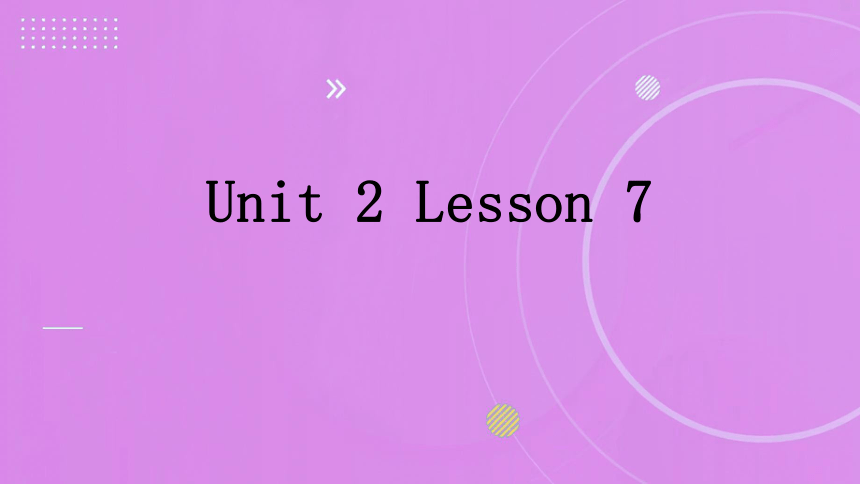
|
|
| 格式 | ppt | ||
| 文件大小 | 968.5KB | ||
| 资源类型 | 教案 | ||
| 版本资源 | 冀教版 | ||
| 科目 | 英语 | ||
| 更新时间 | 2023-09-14 11:59:22 | ||
图片预览

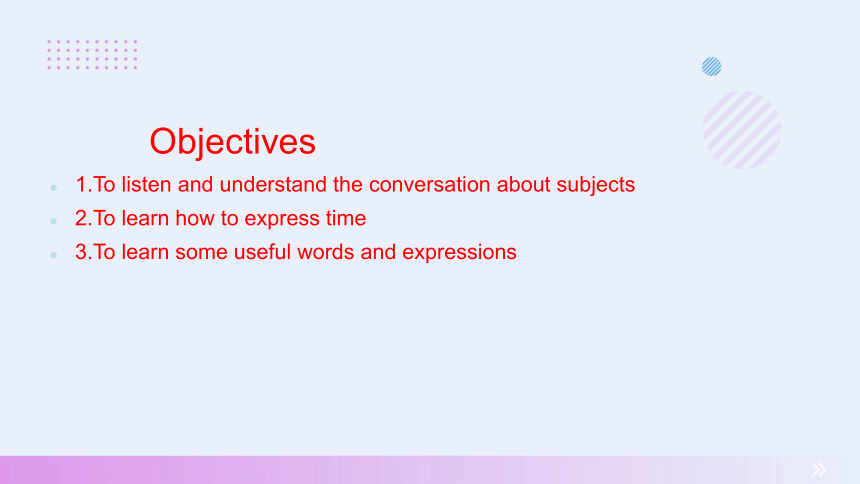
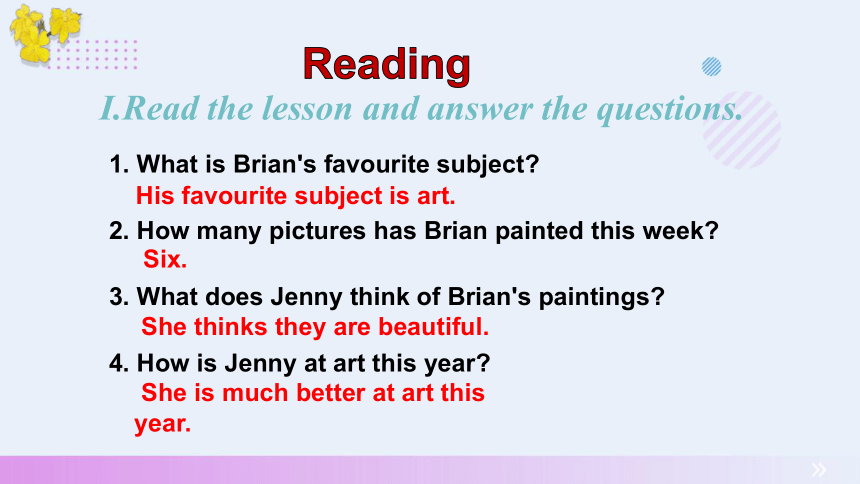
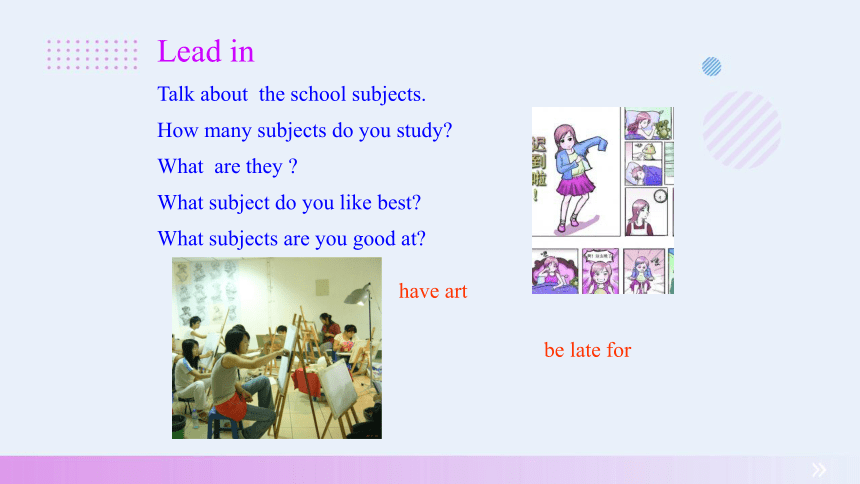
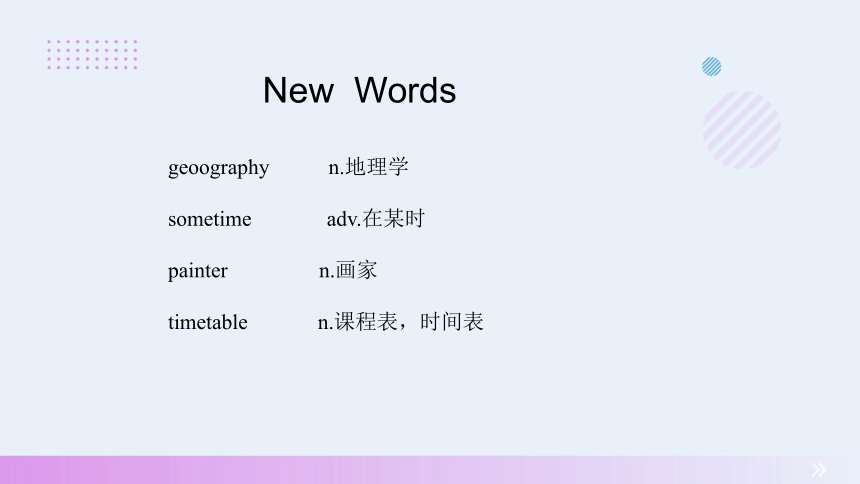
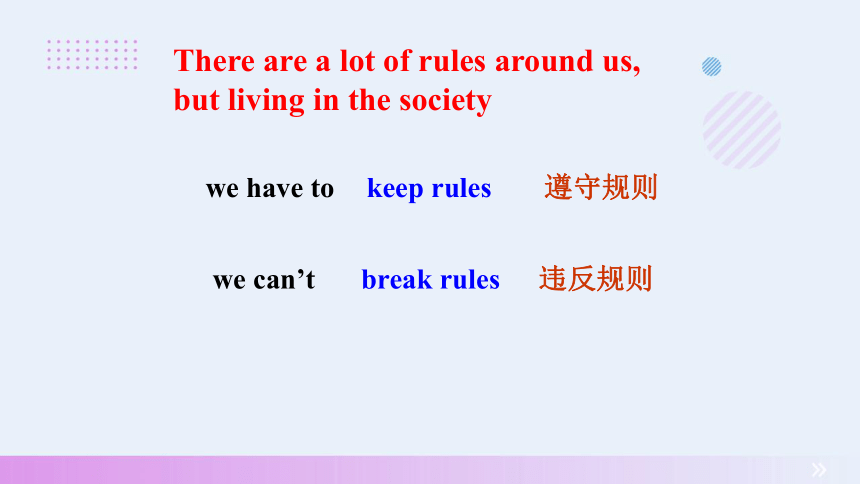
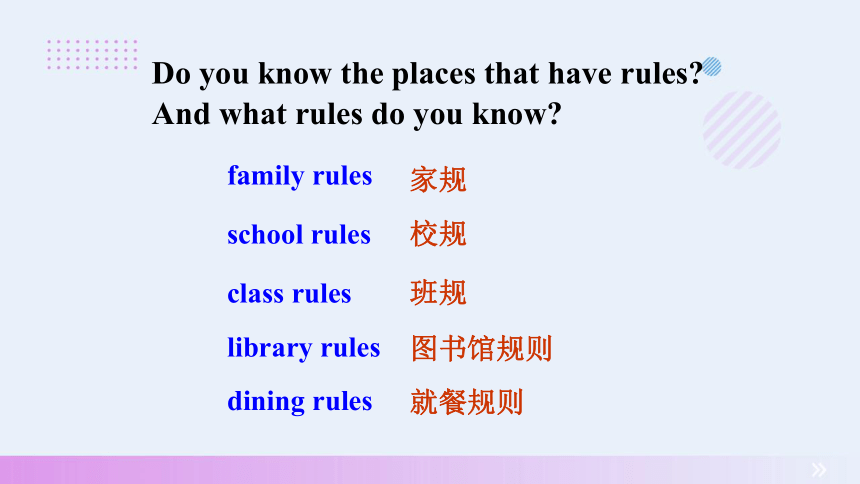
文档简介
(共15张PPT)
Unit 2 Lesson 7
Objectives
1.To listen and understand the conversation about subjects
2.To learn how to express time
3.To learn some useful words and expressions
What is Brian's favourite subject
2. How many pictures has Brian painted this week
3. What does Jenny think of Brian's paintings
4. How is Jenny at art this year
Ⅰ.Read the lesson and answer the questions.
His favourite subject is art.
Six.
She thinks they are beautiful.
She is much better at art this year.
Lead in
Talk about the school subjects.
How many subjects do you study
What are they
What subject do you like best
What subjects are you good at
have art
be late for
New Words
geoography n.地理学
sometime adv.在某时
painter n.画家
timetable n.课程表,时间表
keep rules
break rules
遵守规则
违反规则
There are a lot of rules around us, but living in the society
we have to
we can’t
Do you know the places that have rules And what rules do you know
school rules
class rules
family rules
library rules
dining rules
校规
班规
图书馆规则
就餐规则
家规
2. geography
have geography (class)
3. sometime some time sometimes some times
4. need
5. be good at be much better at
6. one of…
7. in two minutes
8.时间表示法past\after, to 的用法
9.现在完成时态
1. be late for\be late to do
1. We don’t want to _________ class!
be late for
be late for sth. 意思是“干某事迟到 /晚了”
= be late to do sth.
e.g.
Mr. Smith was late for the meeting
yesterday.
e.g.
They were too late to save her.
I have painted six pictures this week!
I have seen some of your paintings.
I've told you many times,Jenny.
She has taught us a lot.
I had geography. I have music class.
Do you have an umbrella
What will you have for lunch
2. 翻译句子,注意have的意义、用法
辨析be good at,be good for与be good to
(1)be good at “擅长”, 后接名词、代词或动名词,可与do well in 相互转换。
e.g. Mr. Brown is American, but he is good at Chinese and Japanese.
=Mr. Brown is American, but he does well in Chinese and Japanese.
布朗先生是一个美国人,但是他擅长汉语和日语。
(2)be good for “对……有好处/有益”,
其反义短语为:be bad for “对……有害处”。
e.g. Eating more vegetables is good for your health.
多吃蔬菜对你的健康有好处。
(3)be good to “对……友好”, 后接名词或代词。
e.g. The old man is very good to his neighbours.
那位老人对他的邻居非常友好。
need vt. 需要; 必须 aux. 必须; 不得不
need作实义动词时的用法
(1)need作实义动词,意为“需要;必须”, need后面的宾语可以是名词、动名词、动词不定式或代词。
e.g. The children in the poor mountain areas need a great deal of money.
贫困山区的孩子们需要大量的钱。
(2)后面需要接带to的动词不定式,表示有义务或者责任去做某事。
e.g. Linda needs to take care of her grandfather in the hospital.
琳达需要在医院照顾她的爷爷。
You need to show your passport to the policeman.
你需要把你的护照给那个警察看。
1.New words: geography, sometime, painter, timetable
2. Phrases: be late for, in two minutes
3. Sentences:①Don’t be late for class!② I hope to see them sometime. ③ I am much better at art this year.④ It’s one of my favourites. ⑤Class will start in two minutes!
Unit 2 Lesson 7
Objectives
1.To listen and understand the conversation about subjects
2.To learn how to express time
3.To learn some useful words and expressions
What is Brian's favourite subject
2. How many pictures has Brian painted this week
3. What does Jenny think of Brian's paintings
4. How is Jenny at art this year
Ⅰ.Read the lesson and answer the questions.
His favourite subject is art.
Six.
She thinks they are beautiful.
She is much better at art this year.
Lead in
Talk about the school subjects.
How many subjects do you study
What are they
What subject do you like best
What subjects are you good at
have art
be late for
New Words
geoography n.地理学
sometime adv.在某时
painter n.画家
timetable n.课程表,时间表
keep rules
break rules
遵守规则
违反规则
There are a lot of rules around us, but living in the society
we have to
we can’t
Do you know the places that have rules And what rules do you know
school rules
class rules
family rules
library rules
dining rules
校规
班规
图书馆规则
就餐规则
家规
2. geography
have geography (class)
3. sometime some time sometimes some times
4. need
5. be good at be much better at
6. one of…
7. in two minutes
8.时间表示法past\after, to 的用法
9.现在完成时态
1. be late for\be late to do
1. We don’t want to _________ class!
be late for
be late for sth. 意思是“干某事迟到 /晚了”
= be late to do sth.
e.g.
Mr. Smith was late for the meeting
yesterday.
e.g.
They were too late to save her.
I have painted six pictures this week!
I have seen some of your paintings.
I've told you many times,Jenny.
She has taught us a lot.
I had geography. I have music class.
Do you have an umbrella
What will you have for lunch
2. 翻译句子,注意have的意义、用法
辨析be good at,be good for与be good to
(1)be good at “擅长”, 后接名词、代词或动名词,可与do well in 相互转换。
e.g. Mr. Brown is American, but he is good at Chinese and Japanese.
=Mr. Brown is American, but he does well in Chinese and Japanese.
布朗先生是一个美国人,但是他擅长汉语和日语。
(2)be good for “对……有好处/有益”,
其反义短语为:be bad for “对……有害处”。
e.g. Eating more vegetables is good for your health.
多吃蔬菜对你的健康有好处。
(3)be good to “对……友好”, 后接名词或代词。
e.g. The old man is very good to his neighbours.
那位老人对他的邻居非常友好。
need vt. 需要; 必须 aux. 必须; 不得不
need作实义动词时的用法
(1)need作实义动词,意为“需要;必须”, need后面的宾语可以是名词、动名词、动词不定式或代词。
e.g. The children in the poor mountain areas need a great deal of money.
贫困山区的孩子们需要大量的钱。
(2)后面需要接带to的动词不定式,表示有义务或者责任去做某事。
e.g. Linda needs to take care of her grandfather in the hospital.
琳达需要在医院照顾她的爷爷。
You need to show your passport to the policeman.
你需要把你的护照给那个警察看。
1.New words: geography, sometime, painter, timetable
2. Phrases: be late for, in two minutes
3. Sentences:①Don’t be late for class!② I hope to see them sometime. ③ I am much better at art this year.④ It’s one of my favourites. ⑤Class will start in two minutes!
同课章节目录
- Unit 1 Me and My Class
- Lesson 1 Back to School!
- Lesson 2 Many Faces, One Picture
- Lesson 3 Getting to Know You!
- Lesson 4 Best Friends
- Lesson 5 Meet Ms. Liu
- Lesson 6 Jenny's Week
- Unit 2 My Favourite School Subject
- Lesson 7 Don't Be Late for Class!
- Lesson 8 E-mail Helpers!
- Lesson 9 I Don't Want to Miss Geography !
- Lesson 10 Looking for Lisa
- Lesson 11 Lily Learns about China !
- Lesson 12 Karen's Hair Stood Up!
- Unit Review
- Unit 3 Families Celebrate Togethe
- Lesson 13 I Love Autumn
- Lesson 14 Happy Memories
- Lesson 15 A Present for Li Ming!
- Lesson 16 Happy Thanksgiving!
- Lesson 17 Presents from Canada!
- Lesson 18 Li Ming's Birthday
- Unit Review
- Unit 4 My Neighbourhood
- Lesson 19 The Best Neighourhood
- Lesson 20 No Stopping!
- Lesson 21 Eat a Donut and Turn Right
- Lesson 22 I Like My Neighbourhood
- Lesson 23 People in My Neighbourhood
- Lesson 24 I Need a Map!
- Unit Review
- Unit 5 My Future
- Lesson 25 I Want to Be a Teacher!
- Lesson 26 What Will I Be ?
- Lesson 27 What's Your Advice?
- Lesson 28 Rich or Poor? It Doesn't Matter!
- Lesson 29 Our Ambitions and Dreams
- Lesson 30 A Famous Friend?
- Unit Review
- Unit 6 Go With Transportation !
- Lesson 31 How Do You Travel ?
- Lesson 32 Trains Go Faster !
- Lesson 33 Life on Wheels
- Lesson 34 Flying Donuts
- Lesson 35 Future Transportation
- Lesson 36 Clean Cars ?
- Unit Review
- Unit 7 Enjoy Your Hobby
- Lesson 37 What's Your Hobby ?
- Lesson 38 Hobbies Are Fun!
- Lesson 39 Danny's Hobby
- Lesson 40 What's Paul's Hobby?
- Lesson 41 Show and Tell!
- Lesson 42 The New Club
- Unit Review
- Unit 8 Celebrating Me
- Lesson 43 What Makes You Unique?
- Lesson 44 Georgia Plays Basketball
- Lesson 45 Be Yourself !
- Lesson 46 My Dream
- Lesson 47 I Made It !
- Lesson 48 Li Ming's Report
- Unit Review
